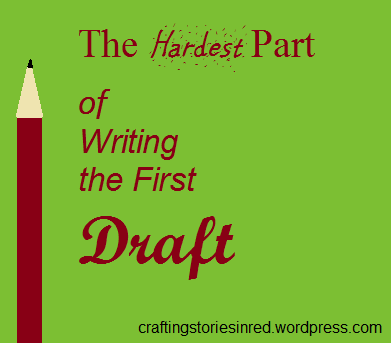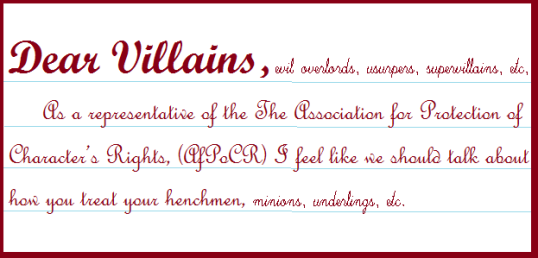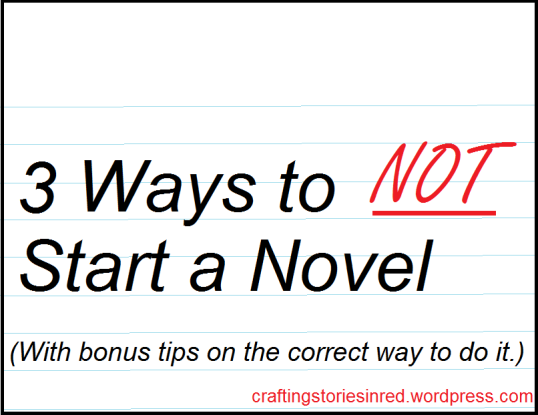The Hardest Part of Writing the First Draft
No one can deny that writing a first draft is a difficult, oftentimes painful experience. In spite of the fact that many authors consider it to be their favorite part of the process (and almost all prefer it over the dreaded editing), it’s not only pleasurable, it is necessary—which always means it will be hard.
Yet even through the long, sleepless nights, the lips chapped and bleeding from chewing on them (I’m guilty of this one, I’m afraid) and the worry about writing a reasonable climax, there is one thing that claims highest on the list of difficult things.
That, with no contest, is starting the novel.
Some novels start easily. IOTW originally started because I was curious as to what the NaNo Young Writer Program would suggest as my word count goal, so I started typing a random story in a browser on my sister’s computer. Somehow, a one-hundred thousand novel was born out of that. Strong, a novel from a few years ago, didn’t start too well; nor did Prince’s Rose, or Joy of Stars, all of which I had to start over several times on that first night of writing. Sometimes novels start easily, but sometimes—nay, usually, they are difficult to start.
We have to start the novel to go anywhere with it. People come up with bizarre ways of trying to get around the nervousness of beginning a novel—not the least of which ranked in oddity being starting in the middle and then going back to fill in the beginning later. I would think that my brain would die from such a lack of continuity that would result from that—but, worse, some people just give into the nervous, vaguely sick feeling in the pit of their stomach, and they never start what would be a brilliant story.
The truth is that there is only one way to remove this obstacle from your path. That way is to sit down, put your fingers on the keyboard, and start typing. You will have to fight your way through the nerves, for there is no way around them. There is only once chance, and that is to start, and start now.
Yes, you may delete it. Yes, you may hate it. Yes, it may be horrible. My first few sentences of Prince’s Rose that I discarded ranged from being nightmare-inducing to a Grammar-Nazi to just plain confusing (“Wait… Was the floor creaking? Or was that the clock? Well, something’s ticking, so that must be the clock… Would that make it the floor creaking? All on its own?). It didn’t really matter, though, for those sentences, removed or not, gave me a springboard into the story. When I eventually settled on my final first sentence, I was ready to write the story, and my nerves had subsided.
You will most likely end up cringing at your first sentence at some point, maybe even cringing at the one you decided to keep. But as long as that first sentence is down and being followed by more words, it doesn’t matter, because you will have gotten through the hardest part of writing a novel.
One million miles,
It starts with a step or two.
(Michael W. Smith)
Just start. Take the first step, and write the novel. From this point on, you’re on the journey—it may be hard, but you’re well on your way to victory.
What have been your experiences with starting novels? Any first sentences that you would like to share? (If you share yours, I’ll share mine!)



 R. J. Larson is the author of numerous devotionals featured in publications such as The Women’s Devotional Bible, and Seasons of a Woman’s Heart. She lives in Colorado Springs, Colorado, with her husband and their two sons, and is suspected of eating chocolate and potato chips at her desk while writing. The Books of the Infinite series marks her debut in the fantasy genre.
R. J. Larson is the author of numerous devotionals featured in publications such as The Women’s Devotional Bible, and Seasons of a Woman’s Heart. She lives in Colorado Springs, Colorado, with her husband and their two sons, and is suspected of eating chocolate and potato chips at her desk while writing. The Books of the Infinite series marks her debut in the fantasy genre.


 ANNE ELISABETH STENGL makes her home in North Carolina, where she lives with her husband, Rohan, a kindle of kitties, and one long-suffering dog. When she’s not writing, she enjoys Shakespeare, opera, and tea, and practices piano, painting, and pastry baking. Her novel Starflower was awarded the 2013 Clive Staples Award, and her novels Heartless, Veiled Rose, and Dragonwitch have each been honored with a Christy Award.
ANNE ELISABETH STENGL makes her home in North Carolina, where she lives with her husband, Rohan, a kindle of kitties, and one long-suffering dog. When she’s not writing, she enjoys Shakespeare, opera, and tea, and practices piano, painting, and pastry baking. Her novel Starflower was awarded the 2013 Clive Staples Award, and her novels Heartless, Veiled Rose, and Dragonwitch have each been honored with a Christy Award. Jaye L. Knight is a 25 year old independent author with a passion for writing Christian fantasy and clean NA fiction. Armed with an active imagination and love for adventure, Jaye weaves stories of truth, faith, and courage with the message that even in the deepest darkness, God’s love shines as a light to offer hope.
Jaye L. Knight is a 25 year old independent author with a passion for writing Christian fantasy and clean NA fiction. Armed with an active imagination and love for adventure, Jaye weaves stories of truth, faith, and courage with the message that even in the deepest darkness, God’s love shines as a light to offer hope.



